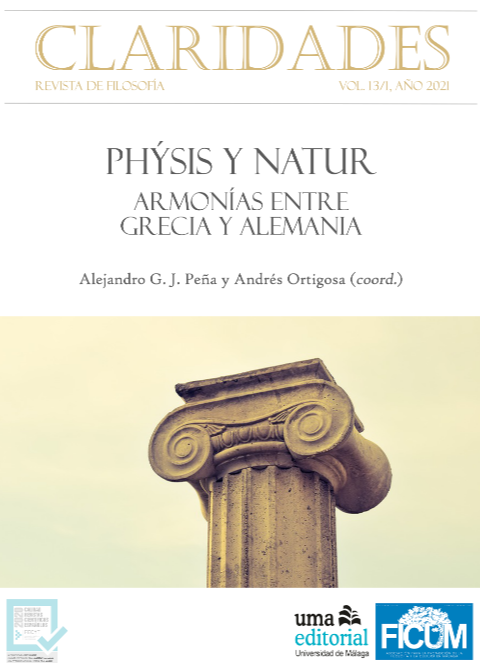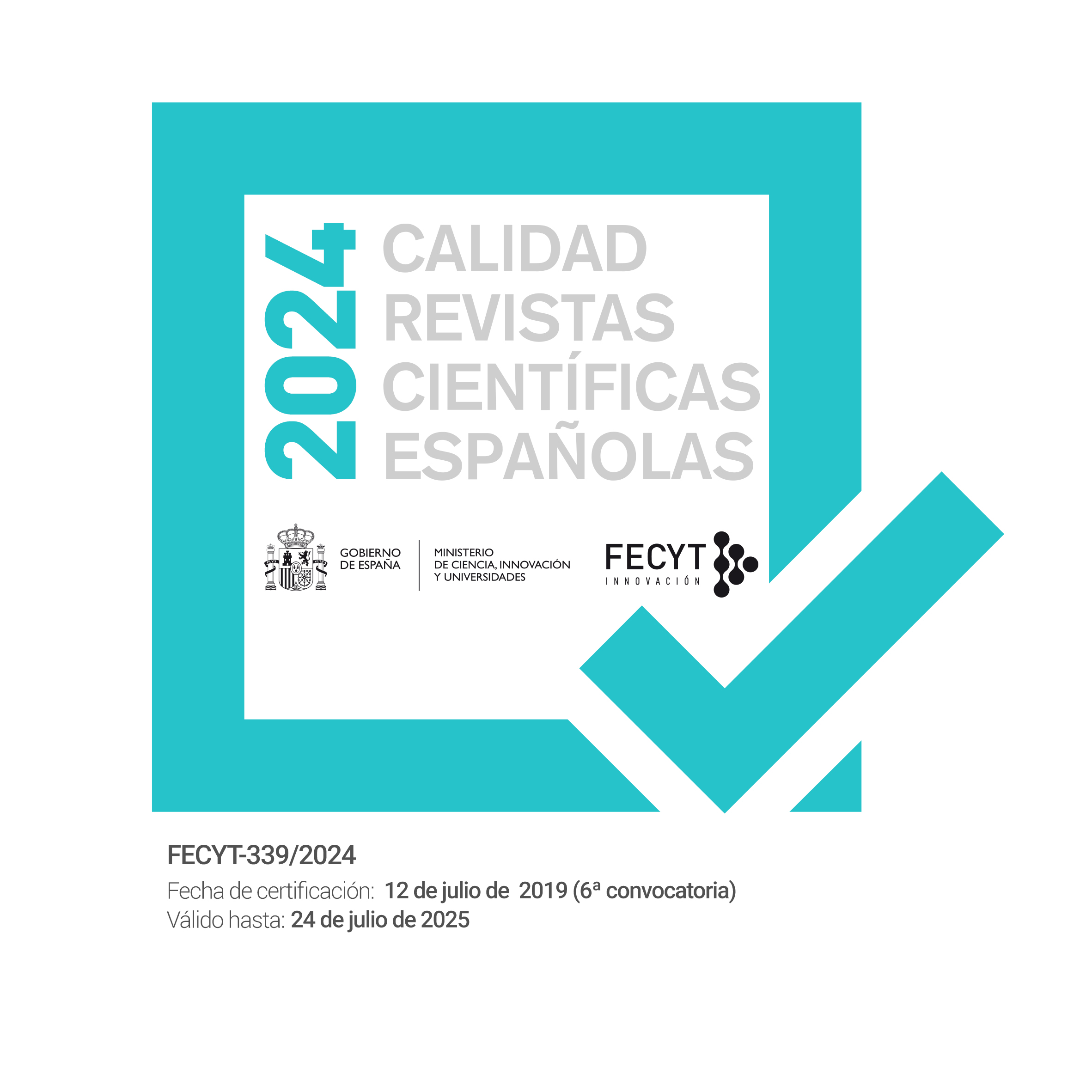Heidegger on the connection between ????? and ???????
Notes for a critical reconsideration
DOI:
https://doi.org/10.24310/Claridadescrf.v13i1.10237Keywords:
Physis, Aletheia, Heraclit, Ontohistorical thoughtAbstract
This paper offers an attempt to reconstruct the way in which Heidegger arrives at his peculiar interpretation of the connection between ????? and ???????, which constitutes a key element of the «hermeneutics of the two beginnings» presented in Beiträge zur Philosophie, and which from then on plays a very important role
within the framework of the «turn» (Kehre) that gives rise to «ontohistorical thinking» (seinsgeschichtliches Denken). For this, the way in which Heidegger interprets the thought of Heraclitus is considered. In addition to trying to contribute to a better understanding of the internal development of Heideggerian thought, the discussion also aims to make possible a critical evaluation of the plausibility of the interpretive construction elaborated by Heidegger.
Downloads
Metrics
Publication Facts
Reviewer profiles N/A
Author statements
Indexed in
-
—
- Academic society
- N/A
- Publisher
- Asociación para la promoción de la filosofía y la cultura en Málaga (FICUM) y UMAEditorial
References
Beardslee, W. J. (1918): The Use of Physis in the Fifth-Century Greek Literature, Chicago: Chicago Un. Press.
Burger, A. (1925) : Les mots de la familie de phyô en grec ancien, Paris: Librairie Ancienne Honoré Champion.
Fischer, K. (1990): Abschied. Die Denkbewegung Martin Heideggers, Würzburg: Köningshausen & Neumann.
Friedländer, P. (1058): Plato. An Introduction, London: Routledge.
Graham, D. W. (2010): The Texts of Early Greek Philosophy, Part I, Cambridge: CUP.
Heidegger, M. – Fink, E. (1970): Heraklit. Seminar Wintersemester 1966/1967, Frankfurt a. M.: V. Klostermann.
Heidegger, M. (1978): «Vom Wesen und Begriff der ?????. Aristoteles, Physik B, 1» (1939), en Wegmarken, Frankfurt a. M.: V. Klostermann.
Heidegger, M. (1978): «Vom Wesen der Wahrheit» (1930), en Wegmarken, Frankfurt a. M.: V. Klostermann.
Heidegger, M. (1979): Heraklit, GA Bd. 55, ed. M. S. Frings, Frankfurt a. M.: V. Klostermann.
Heidegger, M. (1983): Die Grundbegriffe der Metaphysik. Welt –Endlichkeit – Einsamkeit (1929/1930), GA Bd. 29/30, ed. Fr.-W. von Herrmann, Frankfurt a. M. 1992: V. Klostermann.
Heidegger, M. (1986): Sein und Zeit, Tübingen: M. Niemeyer, reimpresión de la 7a. edición de 1953.
Heidegger, M. (1988): «Das Ende der Philosophie und die Aufgabe des Denkens» (1966), en Zur Sache des Denkens, Tübingen: M. Niemeyer (=1969).
Heidegger, M. (1989): Beiträge zur Philosophie (Vom Ereignis) (1936/1938), GA Bd. 65. ed. Fr.-W. von Herrmann, Frankfurt a. M.: V. Klostermann.
Heidegger, M (1989): Besinnung (1938/1939), GA Bd. 66, ed. Fr.-W. von Herrmann, Frankfurt a. M.: V. Klostermann.
Heidegger, M. (1990): Vorträge und Aufsätze, Pfüllingen: G. Neske (=1954).
Heidegger, M. (1991): Kant und das Problem der Metaphysik (1929), 5a. ed. aumentada, ed. W.-Fr. von Herrmann, Frankfurt a. M.: V. Klostermann.
Heidegger, M. (1997): Vom Wesen der Wahrheit. Zu Platons Höhlengleichnis und Theätet (1931/1932), GA 34, ed. H. Mörchen, Frankfurt a. M.: V. Klostermann.
Heidegger, M. (2012): «Platon, Parmenides», en Seminare. Platon –Aristoteles – Augustinus, GA 83, ed. M. Michalski, Frankfurt a. M.: V. Klostermann.
Kahn, Ch. (1979): The Art and Thought of Heraclitus, Cambridge: CUP.
Kirk, G. S. (1975) Heraclitus. The Cosmic Fragments, London – New York: CUP (= 1954).
Laks, A. – Most, G. W. (2016): Early Greek Philosophy, vol. I: Introductory and Reference Materials, Cambridge (Mass.) – London: Harvard Un. Press.
Mannsperger, D. (1969): Physis bei Platon, Berlin: W. De Gruyter.
Marcovich, M. (2001) : Heraclitus, Sankt Augustin : Academia (=Mérida 1967).
Naddaf, G. (1992): L´origine et l´evolution du concept grec de phýsis, Lewiston: The Edwin Mellen Press; versión inglesa: The Greek Concept of Nature, Albany (New York): SUNY Press, 2005.
Szaif, J. (1996): Platons Begriff der Wahrheit, Freiburg – München: K. Alber.
Xolocotzi, A. (ed.) (2018): Heidegger: caminos y giros del pensar, en: Ápeiron.
Estudios de filosofía (Madrid) 9.
Downloads
Published
How to Cite
Issue
Section
License
Esta revista provee acceso libre inmediato a su contenido bajo el principio de hacer disponible gratuitamente la investigación al público. Todos los contenidos publicados en Claridades. Revista de Filosofía, están sujetos a la licencia Creative Commons Reconocimento-NoComercia-Compartirigual 4.0 cuyo texto completo puede consultar en <http://creativecommons.org/licenses/by-nc-sa/4.0>
Es responsabilidad de los autores/as obtener los permisos necesarios de las imágenes que están sujetas a derechos de autor.
Los autores/as cuyas contribuciones sean aceptadas para su publicación en esta revista conservarán el derecho no exclusivo de utilizar sus
contribuciones con fines académicos, de investigación y educativos, incluyendo el auto-archivo o depósito en repositorios de acceso abierto de cualquier tipo.
La edición electrónica de esta revista esta editada por la Editorial de la Universidad de Málaga (UmaEditorial), siendo necesario citar la procedencia en cualquier reproducción parcial o total.

















6.png)
